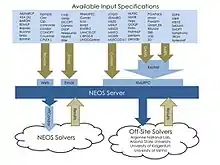The NEOS Server is an Internet-based client-server application that provides free access to a library of optimization solvers. Its library of solvers includes more than 60 commercial, free and open source solvers, which can be applied to mathematical optimization problems of more than 12 different types, including linear programming, integer programming and nonlinear optimization.
The server is managed by the Wisconsin Institute for Discovery at the University of Wisconsin-Madison. Most of the solvers are hosted by the University of Wisconsin in Madison, where jobs run on a cluster of high-performance machines managed by the HTCondor software. A smaller number of solvers are hosted by partner organizations: Arizona State University, the University of Klagenfurt in Austria, and the University of Minho in Portugal. The server was developed in 1996 by the Optimization Technology Center of Argonne National Laboratory and Northwestern University.

Structure
The NEOS (Network-Enabled Optimization System) project[1] was launched in at Argonne National Laboratory and Northwestern University to develop a method to share optimization software resources over the Internet.[2][3][4][5][6] The server went live in 1996, one of the first examples of software as a service.
The NEOS Server is an Internet-based client-server application that provides access to a library of optimization solvers. The server accepts optimization models described in modeling languages, programming languages, and problem-specific formats. Most of the linear programming, integer programming and nonlinear programming solvers accept input from AMPL and/or GAMS. Jobs can be submitted via a web page, email, XML RPC, Kestrel[7] or indirectly via third party submission tools SolverStudio for Excel, OpenSolver, Pyomo, JuMP (through the Julia package NEOS[8]) and the R package rneos. NEOS uses the HTCondor software to manage the workload on a dedicated cluster of computers.[9]
References
- ↑ Savage, Sam (February 18, 2010). "NEOS Reaches New Milestone". redOrbit. Retrieved 19 April 2016.
- ↑ Czyzyk, Joseph; Owen, Jonathan H.; Wright, Stephen J. (1997). "Optimization on the Internet". OR/MS Today. 24 (5): 48–51.
- ↑ Czyzyk, Joseph; Mesnier, Michael P.; Moré, Jorge J. (1998). "The NEOS Server". IEEE Journal on Computational Science and Engineering. 5 (3): 68–75. doi:10.1109/99.714603.
- ↑ Dolan, Elizabeth D.; Fourer, Robert; Moré, Jorge J.; Munson, Todd S. (2002). "Optimization on the NEOS Server" (PDF). SIAM News. 35 (6): 8–9.
- ↑ Puget, JeanFrancois (April 7, 2015). "Computing the Really Optimal Tour Across the USA on the Cloud with Python". IBM developerWorks. Retrieved 19 April 2016.
- ↑ Gill, Philip E.; Murray, Walter; Saunders, Michael A.; Tomlin, John A.; Wright, Margaret H. (May 2008). "George B. Dantzig and systems optimization". Discrete Optimization. 5 (2): 151–158. CiteSeerX 10.1.1.601.2627. doi:10.1016/j.disopt.2007.01.002.
- ↑ Dolan, Elizabeth D.; Fourer, Robert; Goux, Jean-Pierre; Munson, Todd S.; Sarich, Jason (2008). "Kestrel: An Interface from Optimization Modeling Systems to the NEOS Server" (PDF). INFORMS Journal on Computing. 20 (4): 525–538. doi:10.1287/ijoc.1080.0264.
- ↑ "NEOSServer.jl". GitHub. 30 July 2021.
- ↑ Ferris, Michael C.; Mesnier, Michael P.; Moré, Jorge J. (2000). "NEOS and Condor: Solving Nonlinear Optimization Problems over the Internet". ACM Transactions on Mathematical Software. 26: 1–18. CiteSeerX 10.1.1.52.7788. doi:10.1145/347837.347842. S2CID 7286349.
External links
- NEOS Server: official site of the NEOS Server
- NEOS Guide: official site of the NEOS Guide